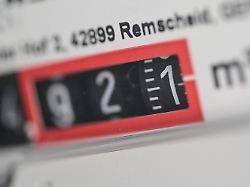Prices have fallen
Gas consumption in Germany is increasing significantly
December 24, 2023, 7:39 a.m
Listen to article
This audio version was artificially generated. More info | Send feedback
Households and especially industry are using significantly more gas than last year, but still less than before Russia’s war of aggression against Ukraine. The network agency considers a gas shortage this winter to be unlikely – but still advises thrift.
Private households and companies in Germany have used 7.2 percent more gas since October 1st than in the same period last year. The newspapers of the Funke media group report this, citing calculations by the Federal Network Agency. Accordingly, gas consumption in private households and businesses increased by 2.5 percent. Industrial gas consumption even rose by 11.1 percent.
However, unlike last year, the network agency is not worried. “We can see that gas consumption increases when it gets cold. But a few cold days don’t worry us,” Netzagentur boss Klaus Müller told the newspapers, according to a preliminary report. The gas storage facilities are around 90 percent full and there are stable imports that secure the gas supply. “A gas shortage this winter is unlikely,” said Müller.
However, the network agency recommends that citizens and companies use gas consciously and think carefully about how much consumption can be saved. This could save you a lot of money.
Gas is cheaper than it has been for a long time
The average gas price for new customers has continued to fall in recent months and, according to the comparison portal Verifox, is currently around 8.25 cents per kilowatt hour – the lowest it has been since October 2021. However, customers previously had to pay significantly less: at the beginning and middle of 2021 the price was between 4.3 and 6.3 cents per kilowatt hour.
According to the network agency’s calculations, gas consumption in Germany fell by 13.9 percent in 2023, despite the increase since October, compared to the winters of 2018 to 2021 – i.e. before the Russian attack on Ukraine and the end of Russian gas deliveries.
